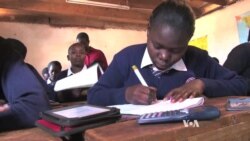At the Kibera Girls Soccer Academy in Nairobi, 17-year-old Naima Hassan and her fellow high school students sit in class, using an e-reader instead of textbooks. The electronic device, known as the Worldreader, can be loaded with hundreds of books.
"I get to learn everything that I want," Hassan said.
On a continent where millions of people can't read, there's a chronic shortage of textbooks in many schools, including the girls' academy.
"The textbooks that we have cannot be used by everyone in the school, so with the e-readers we now can learn at a comfortable pace," Hassan added.
Over the past five years, tens of thousands of free Worldreaders have been provided to students, teachers and libraries in 12 African countries, including Ghana, Nigeria, Ethiopia, Malawi and Zimbabwe. The digital collection comprises about 30,000 books in 40 languages.
The idea came from Worldreader Co-founder and President David Risher, a former marketing executive at Microsoft and Amazon.
"Now that the world is going digital," he said, "this is a good time to try to solve the problem of illiteracy on a scale where people haven't been able to solve it before."
He said the Worldreader is increasing reading comprehension in the schools where it's being used.
Access, portability
With so much information on the device, including books from African authors, teacher Claris Akinyi is pleased that the students can do their own research and learn more than they ever could before. Besides English, there are books in Swahili, Kenya's national language.
Akinyi uses it to plan her classes.
"When I need to prepare a lesson using different books, I can easily access the materials," she explained. "I can carry it home so as to prepare a lesson for different classes."
She said the Worldreader is helping give disadvantaged students a better chance of getting into college after high school.
Hassan dreams of becoming a TV camerawoman.
"Using the e-reader, you can download a book about a camera," she said, "and then you can learn everything about a camera."
In areas without electricity, Risher said, the e-readers can be charged using a simple solar setup at a school or library.
Worldreader also has an app that anyone anywhere can access. By using a phone with a Web browser, thousands of books in several languages are available at read.worldreader.org.





